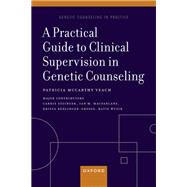A Practical Guide to Clinical Supervision in Genetic Counseling provides a comprehensive overview of clinical supervision, emphasizing the supervision of genetic counseling students. The book draws on theory and research in genetic counseling, psychology, counselor education, and Dr. Veach's many years of experience in supervision practice.
Chapters address key issues in clinical supervision, including the infrastructure required for effective supervision; relationship dynamics inherent in supervision; and critical supervision processes, such as goal setting, feedback, evaluation, culturally-responsive supervision, and common clinical supervision challenges. Additional chapters cover models of supervisor and supervisee development, strategies to promote student wellness, how to recognize and address problematic performance, and supervision delivery models.
Each chapter contains instructional objectives, illustrations of major topics with supervision vignettes and examples, and descriptions of specific strategies for promoting self-reflective supervision practice. Experiential activities at the end of each chapter provide opportunities for readers to strengthen and maintain competencies associated with effective supervision processes and outcomes. The activities are appropriate for both current and future supervisors at all levels of experience and are suitable for use in the classroom and by individuals engaged in self-study.
A Practical Guide to Clinical Supervision in Genetic Counseling also features three contributed chapters by experts in supervision, education, and research and an appendix with instructional tips for designing and conducting supervision training opportunities to facilitate participants' learning experiences.








